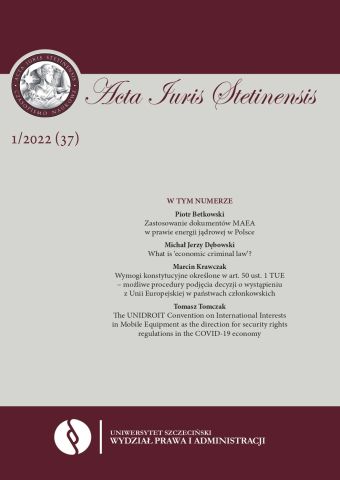







| Authors: |
Michał Jerzy
Dębowski

University of Warsaw, Poland |
| Keywords: | economic criminal law white collar crime object of crime trading Polish criminal law |
| Data publikacji całości: | 2022 |
| Page range: | 15 (27-41) |
| Downloads ?: | 304 |
| 1. | Ajdukiewicz K., Logika pragmatyczna, Warszawa 1965. |
| 2. | Andrejew I., Kodeks karny. Krótki komentarz., Warszawa 1988. |
| 3. | Bojarski M., in: M. Filar (ed.), Kodeks karny. Komentarz, Warszawa 2016. |
| 4. | Franczuk W., Ochrona gospodarki w ustawodawstwie karnym Ukrainy i Polski (cechy wspólne i różnice), “Studia Iuridica Lublinensia” 2013, vol. 20. |
| 5. | Górniok O., Przestępstwa gospodarcze. Rozdział XXXVI i XXXVII Kodeksu karnego. Komentarz, Warszawa 2000. |
| 6. | Holtfreter K., Hartung-Burgess Debate, in: L.M. Salinger (ed.), Encyclopedia of White-Collar & Corporate Crime, vol. 1, Thousand Oaks 2005. |
| 7. | Holtfreter K., Sutherland-Tappan Debate, in: L.M. Salinger (ed.), Encyclopedia of White-Collar & Corporate Crime, vol. 2, Thousand Oaks 2005. |
| 8. | Hryniewicz E., Obrót gospodarczy jako znamię czynu zabronionego, “Kwartalnik Prawa Publicznego” 2011, vol. 3-4. |
| 9. | Konarska-Wrzosek V., Marek A., Prawo karne, Warszawa 2019. |
| 10. | Kotowski W., Kurzępa B., Przestępstwa pozakodeksowe: komentarz, Warszawa 2007. |
| 11. | Kruczalak K., Prawo handlowe: zarys wykładu, Warszawa 2008. |
| 12. | Lindemann C., Gibt es ein eigenes Wirtschaftsstrafrecht?, “Schriften des Instituts für Wirtschaftsrecht an der Universität Jena” 1932, no. 12. |
| 13. | Mucha A., Struktura przestępstwa gospodarczego oraz okoliczności wyłączające bezprawność czynu w prawie karnym gospodarczym: analiza teoretyczna i dogmatyczna, Warszawa 2013. |
| 14. | O’Sullivan R., Edelhertz, Herbert (1922-1999), in: L.M. Salinger (ed.), Encyclopedia of White-Collar & Corporate Crime, vol. 1, Thousand Oaks 2005. |
| 15. | Skorupka J., Prawo karne gospodarcze: zarys wykładu, Warszawa 2007. |
| 16. | Sutherland E.H., White Collar Crime, New York 1949. |
| 17. | Waring E., Weisburd D., White Collar Crime and Criminal Careers, Cambridge 2001. |
| 18. | Wilk L., Zagrodnik J., Prawo i proces karny skarbowy, Warszawa 2019. |
| 19. | Zawłocki R., in: R. Zawłocki (ed.), System prawa handlowego. Vol. X. Prawo karne gospodarcze, Warszawa 2012. |
| 20. | Żółtek S., Prawo karne gospodarcze w aspekcie zasady subsydiarności, Warszawa 2009. |